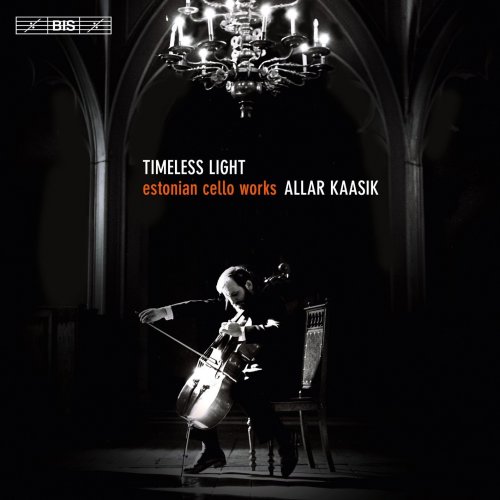
Allar Kaasik - Timeless Light: Estonian Cello Works (2017) CD Rip
BAND/ARTIST: Allar Kaasik
- Title: Timeless Light: Estonian Cello Works
- Year Of Release: 2017
- Label: BIS
- Genre: Classical
- Quality: FLAC (image + .cue, log, artwork)
- Total Time: 80:54 min
- Total Size: 312 MB
- WebSite: Album Preview
Tracklist:
Galina Grigorjeva (b. 1962)
[1] Prayer (Version for Cello & Male Choir)
Kuldar Sink (1942–95)
[2] Lord Have Mercy on Us (Completed A. Kaasik)
Tõnu Kõrvits (b. 1969)
[3]-[6] Excerpts from Seitsme linnu seitse und (Seven Dreams of Seven Birds)
Arvo Pärt (b. 1935)
[7]-[9] Pro et contra, concerto for cello and orchestra (1966)
Galina Grigorjeva
[10]-[12] Recitativo accompagnato
Erkki-Sven Tüür
[13] Spectrum IV for cello and organ (2004)
Galina Grigorjeva (b. 1962)
[1] Prayer (Version for Cello & Male Choir)
Kuldar Sink (1942–95)
[2] Lord Have Mercy on Us (Completed A. Kaasik)
Tõnu Kõrvits (b. 1969)
[3]-[6] Excerpts from Seitsme linnu seitse und (Seven Dreams of Seven Birds)
Arvo Pärt (b. 1935)
[7]-[9] Pro et contra, concerto for cello and orchestra (1966)
Galina Grigorjeva
[10]-[12] Recitativo accompagnato
Erkki-Sven Tüür
[13] Spectrum IV for cello and organ (2004)
You get your money’s worth here: Estonia’s flagship orchestra, two of the finest choirs in the Baltics (and, therefore, the world), some truly delicious organ-playing – all that on what is really a disc of cello music. Allar Kaasik has assembled an album of contemporary works for his instrument that offers a more varied view than usual of Estonia’s contemporary music scene. He writes in the booklet that any music played in a church takes on the guise of ‘Holy Service’ and the pacing of his disc has a ritualistic concentration. But the ambiguity of that phase ‘holy service’ also describes a listening experience with one foot in the spirituality of worship and another in that of humanity and politics.
AdTech Ad
The recording of Arvo Pärt’s Pro et contra (1966) was made for Melodiya in Soviet times. I have never heard Pärt like this: frantic and dissonant, almost suffocating before it stumbles (awkwardly, it has to be said) into a culminating chorale. In Tõnu Kõrvits’s musical fairy tale Seven Dreams of Seven Birds the accompanying ensemble is not orchestra but choir. The selection of four ‘dreams’ here preserves the narrative but presents a journey in texture too, ending in exhaled exchanges between the constituent parts.
Galina Grigorjeva’s Prayer imagines male voices as a heavenly choir high up while Kaasik’s cello kneels at an altar; the Slavic thickness of the composer’s choral writing (she was born in Ukraine) is pitted against the cello’s (originally a saxophone) incantations. Her solo cello piece Recitativo accompagnato is a penetrating work with an unsettling ending and we also hear an unaccompanied work by Kuldar Sink, many of whose works were destroyed in the fire that killed him too. His Lord, have mercy on us is a fervent piece, not without humour, that finds the light of the major in its final breath.
Most resonant of all is Erkki-Sven Tüür’s Spectrum IV for cello and organ, which acknowledges that a cello can never play a duet with a large church’s organ unless the acoustic consciously acts as a musical intermediary. Rooted in a murmuring pedal note, this highly concentrated piece rises up monstrously before ‘ascending to heaven’ via the portal of an extraordinary organ chord, magically registered by Kristīne Adamaite. Kaasik’s playing sounds like an extension of his voice, nothing less and nothing more. One for repeat – or ritualistic – listening. ~ Gramophone
AdTech Ad
The recording of Arvo Pärt’s Pro et contra (1966) was made for Melodiya in Soviet times. I have never heard Pärt like this: frantic and dissonant, almost suffocating before it stumbles (awkwardly, it has to be said) into a culminating chorale. In Tõnu Kõrvits’s musical fairy tale Seven Dreams of Seven Birds the accompanying ensemble is not orchestra but choir. The selection of four ‘dreams’ here preserves the narrative but presents a journey in texture too, ending in exhaled exchanges between the constituent parts.
Galina Grigorjeva’s Prayer imagines male voices as a heavenly choir high up while Kaasik’s cello kneels at an altar; the Slavic thickness of the composer’s choral writing (she was born in Ukraine) is pitted against the cello’s (originally a saxophone) incantations. Her solo cello piece Recitativo accompagnato is a penetrating work with an unsettling ending and we also hear an unaccompanied work by Kuldar Sink, many of whose works were destroyed in the fire that killed him too. His Lord, have mercy on us is a fervent piece, not without humour, that finds the light of the major in its final breath.
Most resonant of all is Erkki-Sven Tüür’s Spectrum IV for cello and organ, which acknowledges that a cello can never play a duet with a large church’s organ unless the acoustic consciously acts as a musical intermediary. Rooted in a murmuring pedal note, this highly concentrated piece rises up monstrously before ‘ascending to heaven’ via the portal of an extraordinary organ chord, magically registered by Kristīne Adamaite. Kaasik’s playing sounds like an extension of his voice, nothing less and nothing more. One for repeat – or ritualistic – listening. ~ Gramophone
Year 2017 | Classical | FLAC / APE | CD-Rip
As a ISRA.CLOUD's PREMIUM member you will have the following benefits:
- Unlimited high speed downloads
- Download directly without waiting time
- Unlimited parallel downloads
- Support for download accelerators
- No advertising
- Resume broken downloads


